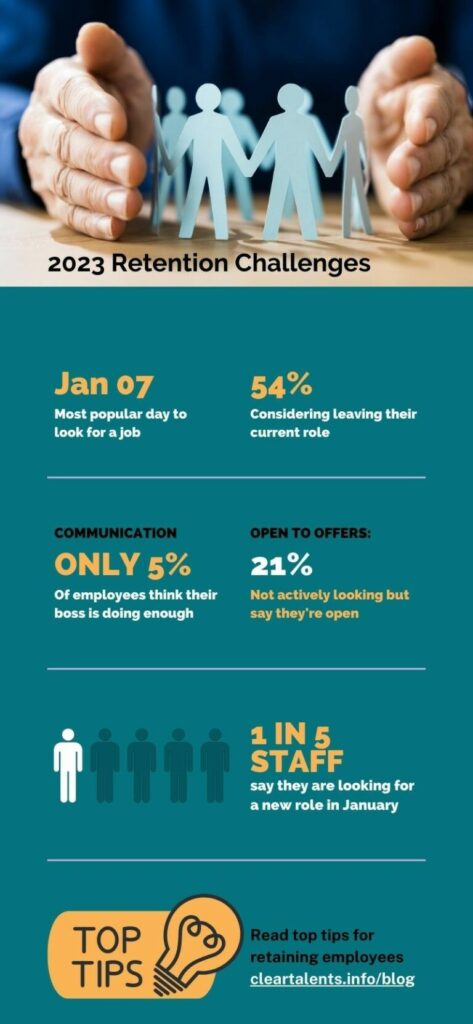The Great Retention: How to retain staff in January 2023
Can you afford to lose a fifth of your workforce?
Job hunting spikes in January, with one report claiming January 7 is peak job hunting time and another reporting that 1 in 5 looks for a new job in January.
Common reasons for looking for a job in January include:
- The January blues: People feel low after the holidays
- Work-life balance: A re-evaluation of priorities after the festive break
- Annual appraisal: January is typically appraisal time; people may feel they don’t get the pay rises, promotions or recognition they need.
Staff retention an increasing challenge
Retaining staff is employers’ most significant challenge; inflation rates are soaring, and most employers can’t keep pace with wage rises.
December saw a wave of strikes from public sector workers protesting because of low pay and conditions, including the RCN, the UK’s biggest nursing union, which went on strike for the first time in its 106-year history.
Over half (54%) of employees were considering leaving their current role.
The crisis prompted Forbes to say we’re beyond the Great Resignation and into the Great Retention, a trend that began before the holidays. WTW reports that in March 2022:
- Over half (54%) of employees were considering leaving their current role
- 18% of UK employees surveyed were actively looking for a new employer
- 15% were looking for a change in career
- 21% were not actively searching but were open to offers.
Reed says a third of people are looking to move jobs because of the cost of living crisis, and only 5% of employees believe their boss is doing enough to support them through it.
How to support and retain staff during the cost-of-living crisis
1. Communicate, Communicate, Communicate
High energy prices, the lasting impact of the pandemic and rising supply chain costs continue to impact employers, and few can match inflationary rises with pay increases.
However, good employers know their staff face challenges, too. Money worries will have an impact on the mental health of your staff.
Keep talking. Let the staff know you understand the pressures and that you’ll help where you can. Make staff part of the solution – they may have ideas for cost-effective ways you can help. Encourage staff to look out for each other and raise concerns if people are struggling.
- ClearTalents Workplace Adjustment Passport empowers conversations between managers and teams.
2. Financial support for employees
While a blanket pay rise may be out-of-reach if you can afford it, consider other ways you can support your employees, such as:
- Free or subsidised breakfast and lunch
- Childcare vouchers
- Assistance with commuting costs (such as a railcard loan)
Consider a cost-of-living bonus if you can afford one but make sure it doesn’t do more harm than good for those claiming Universal Credit or Tax Credits.
3. Reinforce existing benefits

Where you’re already providing support for your employees, for example, an Employee Assistance Programme (EAP) for mental health and other support, make sure they know it’s available and how to use it.
Use newsletters to share details of external support, such as Citizens Advice and Money Advice.
4. Consider the legal implications
Some employees may consider a second role to cope with the cost-of-living crisis. The CIPD advises that you should make sure you know how this affects contracts between you and your employees and the implications of zero-hours workers wanting to take a second job.
5. Support your managers
The cost-of-living crisis is hitting people at all levels. Support your managers and ensure they know how to communicate with their teams about the support you can offer.
6. Reasonable Adjustments for an Inclusive Workplace
By Law, you need to make Reasonable Adjustments for anyone with one of nine protected characteristics.
ClearTalents Inclusion Passport can help you identify these and implement them.
Showing staff you care about the whole person will aid retention.
Flexible working is a great way to retain staff, for example, but make sure that any flexible working policies are fit for disabled people.
Contact us for more information about how ClearTalents can help.